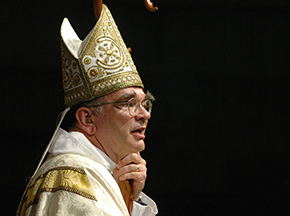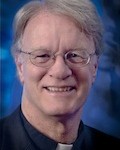By Bp. Paul Hewett
After the savage and tragic attacks of Islamic terrorists in Paris, the Church, as the Sacrament of the Kingdom, continues her mission to bring all men to saving knowledge of Jesus Christ. Christ is for every-man, Jew and Greek, Muslim, Hindu, Buddhist and agnostic. Muslims cannot conquer a people whose God is the Lord, who worship Him every Lord’s Day, and who, every day, work and pray and give for the spread of His Kingdom. A people which turns its back on God is an easy target for Muslim take over, and God may well use the Muslims as agents of judgement for those who reject His Son.
Our enemies in spiritual warfare are the world, the flesh and the devil. The Church teaches her children to keep up the attack on these three enemies, however they manifest themselves. The devil was certainly active in Paris on November 13, and heads of state must work out their escalation of the war against Islamic terrorism. Spiritually, we are to remain always on the offensive. There is no record in the Book of Acts of the apostles ever fighting defensive rear-guard actions. They were always seizing the initiative for Christ, to change a stubborn world for Him. After careful training, always strike hard. “Be strong and of good courage,” for God is with you (Joshua 1). God wants us in a ministry that drives us to our knees in prayer and fasting. Father George Rutler used to say that we are to “launch a revival so impossible that it is doomed to failure without God.”
We are to extend the Kingdom, and cure souls. Bring them in, and set them on the path to spiritual maturity in Christ. To do this we do not need to manufacture strategies. Our vocation is to produce saints first, then strategies. Saints are the ones who accept God´s challenge to grow spiritually and to grow in break-through thinking. Breakthrough thinking is to accomplish seemingly impossible goals through new and creative approaches, and to let go of entrenched patterns of thought, behavior and organizational structure that bind us to the mundane and keep us from reaching our goal, to present every man mature in Christ. Orthodox Christians are the branches connected with Jesus, the true Vine, with roots secured in heaven, drawing all resources from the Lion of the Tribe of Judah, risen and victorious. Orthodox Christians are therefore the strongest, the freest, and the most creative agents in breakthrough thinking. Mother Teresa of Calcutta is a perfect example of this. With her deep roots in Christ, thoroughly soaked in prayer and the sacraments and in the Tradition of holy Mother Church, she, penniless, did what no social worker could ever do among the poorest of the poor. She is regarded by multitudes today, Christian, Hindu, Muslim and agnostic, as the Mother of India. Malcolm Muggeridge, the famous BBC journalist, was converted to Christ by being with Mother Teresa for a film shoot.
We can also recall the example of St. Francis of Assisi. His breakthrough thinking was to go on one of the Crusades, and visit a Muslim sultan and spent some time with him. This sultan said that “if all the crusaders were like you, I would have to join you and become a Christian.” The witness of the saints to wholeness of life in Christ is so engaging that Muslims, and others, are left with no choice but to become Christians, or make martyrs of the saints. The Rev. Canon Andrew White, the Anglican vicar of St. George’s in Baghdad, has a large congregation full of Muslim converts. Many of them disappear every week, to be executed, but their ranks are quickly filled by new converts. Canon White’s nickname is “The Vicar of Baghdad.”
The Isis terrorists and their 7th century predecessors, the Muslims who took nearly the entire Mediterranean world by terror and bloodshed, are really the dupes of the barbarian gods, the demons, who demand human sacrifice and human blood. In stark contrast to this, the Son of God, the Father Almighty, gives His Body and sheds His Blood for us, for the life of the world. Bishop Charles Grafton, the Patron Saint of the Episcopal Church, counseled his priests in Wisconsin a hundred years ago: “Let us be inebriated with the Blood of the Holy Sacrifice, and on fire with the Holy Spirit.”
Let us pray the prayer for Missions in the Prayer Book on page 38: “O God, who hast made of one blood all nations of men for to dwell on the face of the whole earth, and didst send thy blessed Son to preach peace to them that are far off and to them that are nigh; Grant that all men everywhere may seek after thee and find thee. Bring the nations into thy fold, pour out thy Spirit upon all flesh, and hasten thy kingdom; through Jesus Christ our Lord. Amen.”



 is an organic portion of the one, holy, catholic and apostolic Church that was established by God’s action in the first century. In previous centuries, we have participated mightily in missionary work, church planting and serving those in need, all centered on the glorification of Christ and His presence and action in the Sacraments. We have contributed to enriching our worship, restored the Religious Life to our church, reintroduced Retreats, Sacramental Confession and Spiritual Direction, and the riches of the personal prayer life from all ages of Christian history. We, as members of Forward in Faith North America (FIFNA) rejoice that we have a share in this wonderful heritage. However, we in North America are facing challenges to our continued participation in the fulness of this inheritance, and I would like to address one of these here: Church Planting.
is an organic portion of the one, holy, catholic and apostolic Church that was established by God’s action in the first century. In previous centuries, we have participated mightily in missionary work, church planting and serving those in need, all centered on the glorification of Christ and His presence and action in the Sacraments. We have contributed to enriching our worship, restored the Religious Life to our church, reintroduced Retreats, Sacramental Confession and Spiritual Direction, and the riches of the personal prayer life from all ages of Christian history. We, as members of Forward in Faith North America (FIFNA) rejoice that we have a share in this wonderful heritage. However, we in North America are facing challenges to our continued participation in the fulness of this inheritance, and I would like to address one of these here: Church Planting.